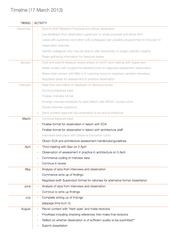|
This text is concerned with participant attitudes to retraining and could be included in the data analysis and discussion section.
Across the seven interviews, the most contentious issue was whether a shift towards multimodality and presentation of academic ideas presented in non-traditional forms called for a rethink in how tutors are trained. This area of discussion also prompted the most emotional response. As discussed within the literature review, NAME suggests that [include section here from lit review where two authors talk about a need for retraining or event to rethink the role of the tutor]. Of the seven participants, three responded defensively to the question [detail here followed by an indented quote]. In contrast, amongst some other participants there was an acknowledgement - and in one instance a positive embracing - of the suggestion that tutors involved with assessing digital multimodal assignments might participate in training tailored to such work. It is perhaps significant that participants who accepted the need for additional training had academic or professional backgrounds within the creative arts, including film, ceramics and animation. Those who were most defensive meanwhile had earlier experience of multimodal work in an academic setting. The size of the sample here is too small to draw any meaningful conclusions on whether tutors who have themselves trained and worked in disciplines where text is not the dominant form of expression or representing ideas, are more inclined to accept a need to receive training to contend with student work that looks beyond words on page or screen. Nevertheless, there was an acceptance across participants that experience of multimodality as a student had subsequently informed their approach as tutors....
0 Comments
Leave a Reply. |
Categories
All
Archives
October 2013
TimelineOther stuff
|
